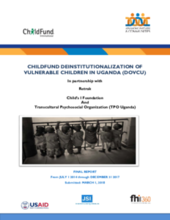Displaying 641 - 650 of 991
In this webinar from RISE Learning Network, the speaker, Yashoda Upreti shares how Terre des Hommes in Nepal has implemented a case management program.
This quantitative study contributes knowledge regarding the attitude of professionals towards positive parenting and child participation.
This final report on the “Deinstitutionalization of Vulnerable Children in Uganda” (DOVCU) project identifies its successes as well as some shortcomings and key learning that is directly relevant to other projects working to support family care for children.
This paper presents findings from two studies, in England (2012) and Ireland (2013), which explored experiences of unaccompanied refugee minors (URM) in foster care.
The current study presents findings from a survey of child welfare caseworkers' experiences with reunifications and focuses on practices and key factors at the casework practice and at the system-environment level to assist in achieving successful reunification.
This paper examines the longer term outcomes of young people who experienced out of home care (OHC) as children, in Britain, Germany and Finland, countries characterised by different welfare regimes.
This paper analyzes the perspectives of eleven social workers doing child protection work and examines the accounts of thirteen parents living with mental illness or addiction who have been involved in child custody investigations in Aotearoa New Zealand.
This paper advocates for use of the life course perspective as a guiding research paradigm when investigating the educational experiences of adult care leavers.
Through this study, data were collected through interviews with 23 care leavers in Ghana to examine their challenges and the factors that influence their coping mechanisms.
This study sought to investigate the lived experiences of care leavers from institutional care facility in Botswana.

